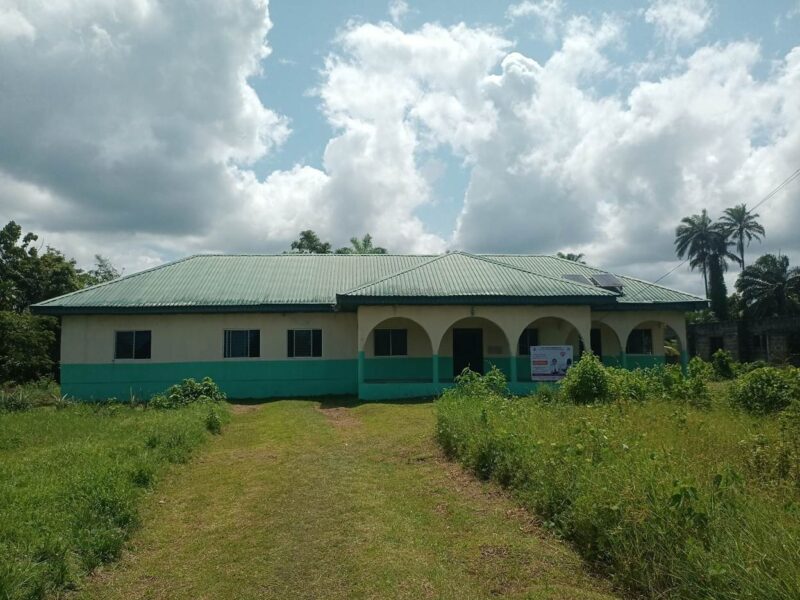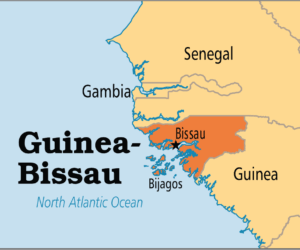Queen Purple, 25, keenly looked forward to the arrival of her first child. Pregnancy had caused her nausea and fatigue, and she struggled with the increasing weight of the growing baby.
She attended the primary healthcare centre (PHC) in her community of Emere Oke kingdom in the Eastern Obolo LGA of Akwa Ibom State for antenatal care. However, as her due date drew closer, she was advised to deliver with a traditional birth attendant (TBA) in a neighbouring village – a path many women in the community take.
“The PHC rarely opens at night. So, our community’s women advised me against taking chances in case the baby comes at night,” she recalled.
Five months into her pregnancy, Mrs Purple had witnessed a neighbour lose her baby at childbirth because there was no health worker to attend to her at the PHC after she went into labour at night.
The woman returned home to give birth, but she had serious bleeding, which local remedies failed to stop.

“Because of what I witnessed and the advice I was given, some weeks before my due date, I moved to stay with a TBA in the nearby village,” Mrs Purple said.
However, in January 2024, after several hours of difficult labour, her baby came out lifeless.
“It was one of the worst days of my life. The pregnancy stress I went through for nine months was without a reward. If the health centre functions day and night, my baby would not have died because I would have given birth there.”
Mercy Ishmael had a similar experience before giving birth on 4 May in the same community.
Because the PHC did not open that night, she had to deliver her baby at home. Sadly, it did not survive.

At least, she and Mrs Purple survived to tell their stories. 45-year-old Blessing Jimmy, also from the same village, was not as fortunate.
As she did with her previous five children, the late Mrs Jimmy had to give birth at home when her labour pains began on the night of 6 April. But the labour dragged on longer than usual.
“We had all our babies at home because the health centre was always closed at night,” said her husband, Emmanuel.
After a prolonged obstructed labour, the baby was delivered, but the mother was so weak that she was unable to speak.
She died the next day, and the baby two months later.
“If there were health workers to deliver my mother of the baby, I wouldn’t be motherless today,” lamented their first son, Sam.
Sam Jimmy, still a student, has a big dream of funding medical staff at the PHC to prevent more child and maternal deaths, in dedication to the memory of his mother.

According to Reuben Jonah, the chief of staff to the village head, Emere Oke Kingdom loses women and babies during childbirth due to the inadequacies of its PHC.
No staff, equipment for emergencies, deliveries
This reporter visited the facility in late May. It had no fence or staff quarters. Even if it had health workers, they would not feel safe to work at night to provide emergency services.

The centre has only one full-time employee – Ruth Awajiogak, a Community Health Environmental Worker (CHEW) who is also the officer-in-charge.
An ad-hoc staff member posted to the facility in 2024 does not work every day due to the distance from his home and transport costs.
As a CHEW, Ms Awajiogak is not qualified to take deliveries or provide obstetrics care, according to the Nigerian government’s Minimum Standards for Primary Health Care Centres.
However, having served alone at the facility since 2001, she is often forced to go beyond her role. She said she had conducted at least four deliveries over the years.
She sometimes stayed at the ward without returning home for four days.
Conducting the reporter around the dilapidated facility, Ms Awajiogak lamented that the poor working conditions limited the impact of her services.

She said if the facility were rehabilitated and provided with staff quarters and qualified staff, the community members would be elated to attend for healthcare services.
Emere-Oke PHC reflects the conditions of many other PHCs in oil-rich Akwa Ibom State.
The national standard is for PHCs to provide 24-hour daily services. However, no PHC in the Eastern Obolo Local Government Area does this, due to staff shortage and inadequate facilities. Many others face the same challenges across Akwa Ibom State.
Like Emere-Oke, like Odot
On 12 June 2024, Solomon Wilson and his five-month-old pregnant wife, Uduak, joined their neighbours in celebrating the inauguration of a new Model PHC in Odot, Nsit Atai LGA. Their home is a stone’s throw from the facility, and Mr Wilson recalled the relief he felt.
“We were happy to attend the inauguration because we had planned that my wife would give birth there,” he recalled.

However, on 23 October 2024, when his wife went into labour, they discovered that no health worker had been posted to the centre.
Mrs Wilson had to rely on TBAs for the delivery. However, the birth had complications, leading to her death.
Although their baby survived, Mr Wilson said his wife’s death was avoidable.
During four visits to the facility between 10 and 25 May, this reporter met no health worker or security guard.
The chief of Ikot Ekpuk, where the facility is located, Dickson Etim, said a few workers were posted to the facility in late 2024.
“At night, the few hands there retire home. We need nurses. There is no medicine there either. Government should employ more workers and supervise them,” he pleaded.

The Akwa Ibom State Government inaugurated a new ‘model PHC’ in Abiakana, a community in Ika LGA, on 21 February. However, four months later, the facility remained locked as no health worker had been posted there.

The village head, John Afangideh, confirmed that the PHC had not commenced operations.
“Since the facility is yet to be operational, when we get sick, we go far away to other communities to get services. Our women who desire to get their children immunised pay up to N2,000 transport fare. When our women want to give birth, they go to TBAs and sometimes die in the process,” said Mr Afangideh.

The condition at the model health centre at Utu in Etim Ekpo LGA was not different when this reporter visited the facility on the nights and early mornings of 17 and 18 May – no medical staff or security officer was on duty.
The community members told PREMIUM TIMES that the facility operates only during the day due to staff shortage.

At the Oboyo Ikot Ita PHC in Nsit Ibom LGA, on the night of 7 May and the morning of 8 May, only two security guards were there.
They explained that the facility had five medical staff members, who sometimes work at night.

The story was not so different at the Eyulor PHC in Uruefong Oruko LGA.
When the reporter visited on the nights of 29 and 30 May, he met the officer-in-charge, Rose Umoh.
Mrs Umoh was the only medical staff member assigned to the facility. She expressed her concerns about the facility.
Her worries were the leaky roof and unfinished work on the staff quarters of the facility.
The Deputy Village Council Chairman of Eyulor, Okon Okpoyo, was also unhappy that the facility had only one medical staff member.

“The nurse there has made significant sacrifices to stay in the facility since it was commissioned on 21 May 2025. When it rains, the place is flooded due to the leaky roof,” he said.
“The keys of the doors were not fixed for the staff quarters and the main facility, hence she is unable to use them. She has complained several times, and this may discourage her from making further sacrifices.”
Akwa Ibom has some health centres it labels as model healthcare centres. These are well constructed and often have the necessary equipment, although they also suffer from staff shortages.
Investigations by this reporter reveal that among the model healthcare centres in Akwa Ibom, Eyulor PHC is the only one with shabby construction. When it rains, the facility becomes unusable. Rainwater from the leaky roof, witnessed by this reporter, could also destroy the medical equipment at the facility. However, all the model healthcare centres suffer from staff shortages.
Personnel shortage affecting maternal care
On 4 June, this reporter submitted a Freedom of Information (FOI) request to the Executive Secretary of Akwa Ibom State Primary Health Development Agency, Eno Attah, seeking data on the distribution of health care workers across the state’s PHCs.
The request specifically asked for staffing levels in 13 key positions, including medical officers, community health officers (CHO), nurses/midwives, community health extension workers (CHEWs), pharmacy technicians, junior community health extension workers, environmental officers, medical records officers, laboratory technicians, health attendants/assistants, security personnel and general maintenance staff.
Mr Attah did not respond to the request, despite his acknowledgement of it and several reminders through phone calls, text and WhatsApp messages.
However, credible sources in the agency revealed that Akwa Ibom State currently has 2,164 workers across its 468 PHCs, including ad-hoc staff funded through the Basic Health Care Provision Fund.
This implies that on average, a PHC has fewer than five workers, a far cry from the 24 recommended by the National Primary Health Care Development Agency as a minimum.
Due to this shortage, PHCs, especially in the state’s rural areas, have only one worker, often a CHEW, and a nurse at best. These facilities lack laboratory technicians, pharmacy technicians and medical officers.
Due to a shortage of healthcare workers, maternal care indicators in Akwa Ibom State have been very poor in the last few years.
For instance, according to the Nigeria Demographic and Health Survey 2023-2024, Akwa Ibom State has one of the lowest percentages (38.6 per cent) of live births delivered in a health facility in the country. It ranks lowest among the 17 southern states of Nigeria. It also ranks lower than five of the six north-central states and three out of six north-east states.
The report further shows that Akwa Ibom has one of the lowest percentages of births delivered by a skilled provider (51.5 per cent) in Nigeria, the lowest across the southern and North-central states except Niger.
 As a result, Akwa Ibom State now has a prevalence of maternal mortality rate of 774 per 100,000 lives, according to District Health Information Software 2, a free and open-source software platform primarily used for managing and analysing health information in Nigeria.
As a result, Akwa Ibom State now has a prevalence of maternal mortality rate of 774 per 100,000 lives, according to District Health Information Software 2, a free and open-source software platform primarily used for managing and analysing health information in Nigeria.
Proposed employment of 1,000 health workers
In June, the Akwa Ibom State Head of Civil Service, Effiong Essien, announced that the state government would employ 1,000 medical personnel.
However, he did not state the number that would be posted to PHCs.
When this reporter reached out to the Commissioner for Health, Ekem Emmanuel, and shared the findings of this investigation, he said the government was aware of the staffing challenges in the primary healthcare sector and that it was responding by the 1,000 medical personnel to be employed.
When asked why the Governor Umo Eno administration waited for two years before intervening, the commissioner said reviews of the number of personnel to be employed had caused the delay.
Even if the proposed 1,000 medical personnel are employed and posted to the 468 PHCs, the staff strength would still fall below the minimum standard set by the NPHCDA.
For PHCs in Nigeria, the agency provides that for effective healthcare delivery, a PHC should have at least 19 medical personnel and five support staff, totalling 24.
This number will provide qualified staff for each of the medical units and provide an opportunity for staff to run shifts, including night, thus being available to address emergency cases.
 Staffing the 468 PHCs in Akwa Ibom State with 24 workers each means 11,232 staff are required, in addition to the supporting staff. If all the 1,000 healthcare workers to be employed are sent to the PHCs with the existing 2,164 workers, there will still be a shortfall of 8,068 workers.
Staffing the 468 PHCs in Akwa Ibom State with 24 workers each means 11,232 staff are required, in addition to the supporting staff. If all the 1,000 healthcare workers to be employed are sent to the PHCs with the existing 2,164 workers, there will still be a shortfall of 8,068 workers.
The Commissioner for Health explained why the state cannot meet the staff standards prescribed by the NPHCDA, saying development is a process.
“How many countries have that standard? Even in those countries we refer to, do they have that doctor/patient ratio? It is a prescription. It is ideal, but even in the UK, the government is complaining that they don’t have enough doctors. Why do you think they are taking Nigerians?
“Our approach must be systematic. We recognise that there is an issue. We are taking steps to solve the issue, and we are making progress towards it,” Mr Emmanuel said.
Staff shortage thwarting government efforts
The Akwa Ibom administration also appears to be taking steps to address infrastructural challenges at the primary healthcare level.
An analysis of the 2023 and 2024 Revised Budget of Akwa Ibom State shows that the administration budgeted N6.47 billion for the construction of 15 model PHCs, of which nine have so far been commissioned.
According to the 2025 approved budget, N7.55 billion was voted for the building and rehabilitation of 16 PHCs.
However, as shown by this investigation, the benefits of the model PHCs have yet to be optimised because of the shortage of healthcare professionals at the facilities.
This reporter visited five of the model PHCs to assess the provision of emergency services at night.
Out of the five, in Utu in Etim Ekpo, Abiakana in Ika, Odot in Nsit Atai, Oboyo Ikot Ita in Nsit Ibom, and Eyulor in Uruefong Oruko, only the Eyulor PHC had a medical staff at night.
Consequently, the unavailability of manpower at these facilities at night continues to contribute to the high maternal and child mortality rates in the state.
READ ALSO: SPECIAL REPORT: Nigerians with albinism dying of skin cancer due to healthcare gaps
Billions spent on 13 SUVs
Contrary to the claims by the Commissioner for Health that the government was constrained by funds to meet the minimum staffing standard, data show that the challenge is being aggravated by poor prioritisation.
For instance, the 2024 Full Year Budget Performance Report of Akwa Ibom State shows that the State Primary Health Care Development Agency spent N37.1 million as personnel cost on the 2,164 staff in the health facilities and in the agency.
If 10,820 workers (2,164 multiplied by five) are added to the existing 2167 staff, expenditures at the same ratio will mean the total 12,984 (which is 1,752 above the recommended minimum standard), would in a fiscal year consume N222.6 million as personnel cost in the state’s 468 PHCs.
That N222.6million is 3.9 per cent of the N5.59 billion personnel cost of the Hospitals Management Board, which administers the staff of the 41 government hospitals in the state.
Meanwhile, the funds for those staff would not be difficult to get if the government prioritises it. In May 2025, the state governor gave new SUVs to 13 National Assembly members despite the lawmakers already receiving similar vehicles from the federal government.
The donation sparked criticism with calls that the funds should have been channelled to critical sectors such as healthcare.
According to the 2025 Approved Budget of Akwa Ibom State, each of the SUVs costs N100 million, and the 13 cost N1.3 billion.
At a personnel cost of N222.6 million for 12,984 staff, if the N1.3 billion spent on the exotic vehicles were redirected to the staff needs of PHCs, it would cover at least five years’ salary (N1.113bn) with N187 million left.












